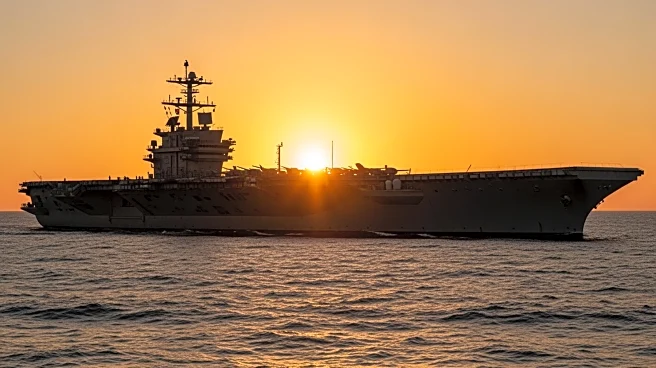What's Happening?
China has officially put its most advanced aircraft carrier, the CNS Fujian, into service, marking a major milestone in its military development. The Fujian, equipped with electromagnetic catapults, was
commissioned at a ceremony attended by President Xi Jinping. This technology allows the carrier to launch heavier fixed-wing aircraft, significantly boosting its combat power. The Fujian is part of China's strategy to develop a 'world-class' military by 2049, coinciding with the centennial of the People's Republic of China. The carrier's commissioning is a key component of China's naval expansion, which includes the world's largest navy by hull count, with over 370 vessels.
Why It's Important?
The Fujian's entry into service represents a significant enhancement of China's naval capabilities, allowing it to project power further into the Indo-Pacific region. This development could challenge U.S. naval dominance, as the Fujian is one of only two carriers globally equipped with electromagnetic catapults, the other being the USS Gerald R. Ford. The carrier's advanced technology extends the reach and effectiveness of China's carrier-based strike aircraft, potentially altering the strategic balance in the region. As China continues to modernize its military, the U.S. and its allies may need to adapt their strategies to address the growing capabilities of the Chinese navy.
What's Next?
China's naval expansion is expected to continue, with plans to build a fourth aircraft carrier. The potential for this vessel to be nuclear-powered would further enhance China's ability to operate globally without the need for refueling. The Fujian's commissioning has already strengthened China's naval presence in the South China Sea, where territorial claims overlap with other countries and the U.S. Navy frequently operates. The international community will be closely watching China's military developments, as they could have significant implications for regional security and global power dynamics.
Beyond the Headlines
The Fujian's commissioning underscores China's broader strategic intent to expand its global influence and reinforce its domestic legitimacy. The carrier's advanced capabilities highlight China's commitment to developing a modern military that can deter major powers and pressure regional actors. As China continues to showcase its military assets, the international community must consider the long-term impacts of China's growing military presence. The development of electromagnetic catapult technology positions China as a leader in naval innovation, potentially setting new standards for aircraft carrier operations.










